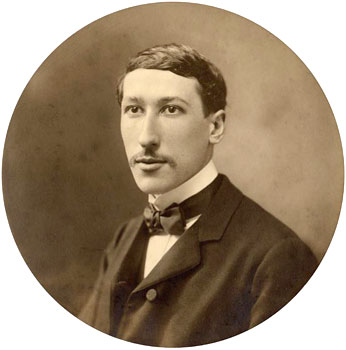“The “end of a world” never is and never can be anything but the end of an illusion.”
The Reign of Quantity and the Signs of the Times (1945)
René Guénon foi um intelectual francês do século XX tido por alguns como 'inclassificável'. Sua influente obra não obstante isso pode ser classificada em três vertentes; a exposição da metafísica tradicional, a crítica ao materialismo e individualismo do mundo moderno e a explicação do simbolismo das civilizações tradicionais, em especial das civilizações hindu, chinesa, islâmica e cristã.Guenón publicou dezessete livros durante sua vida, além de dez coletâneas lançadas postumamente. Esses livros referem-se a uma gama diversificada de temas, tais como; a metafísica, o simbolismo e a crítica social. Ele influenciou intelectuais, artistas, filósofos e acadêmicos de diversos campos do conhecimento, tais como o romeno Mircea Eliade, os suíços Frithjof Schuon e Titus Burckhardt, os franceses Raymond Queneau e André Breton, os norte-americanos Huston Smith e Steve Bannon, o russo Aleksandr Dugin e o brasileiro Mateus Soares de Azevedo.
Um conceito fundamental formulado por Guénon foi o da distinção, em toda civilização ou tradição religiosa, entre uma dimensão exterior ou legal, o exoterismo, e uma dimensão interior ou contemplativa, o esoterismo. Este discernimento entre exoterismo e esoterismo perpassa não apenas a obra de Guénon, mas toda a vasta produção contemporânea da escola da Filosofia Perene.

“The “end of a world” never is and never can be anything but the end of an illusion.”
The Reign of Quantity and the Signs of the Times (1945)
Fonte: The Crisis of the Modern World (1927), p. 47
Fonte: The Crisis of the Modern World (1927), p. 50
Fonte: The Crisis of the Modern World (1927), p. 93
Fonte: The Crisis of the Modern World (1927), p. 59
Fonte: The Crisis of the Modern World (1927), p. 98
Fonte: The Crisis of the Modern World (1927), p. 98
Initiation et réalisation spirituelle (Initiation And Spiritual Realization) (1952)
Fonte: The Crisis of the Modern World (1927), p. 103
Fonte: Spiritual Authority and Temporal Power (1929), p. 30
Fonte: The Reign of Quantity and Signs of the Times (1945), p. 289
Fonte: The Crisis of the Modern World (1927), p. 75
Fonte: The Crisis of the Modern World (1927), p. 109
Introduction générale à l'étude des doctrines hindoues (Introduction to the Study of the Hindu Doctrines) (1921)
Fonte: The Crisis of the Modern World (1927), p. 51
Fonte: The Crisis of the Modern World (1927), pp. 97-98
La crise du monde moderne (The Crisis of the Modern World) (1927)
Fonte: The Reign of Quantity and Signs of the Times (1945), p. 288
“If an idea is true, it belongs equally to all who are capable of understanding it.”
Fonte: The Crisis of the Modern World (1927), p. 73
Fonte: The Crisis of the Modern World (1927), pp. 65-66
Fonte: The Crisis of the Modern World (1927), p. 56
Fonte: Spiritual Authority and Temporal Power (1929), pp. 77–78
Fonte: Spiritual Authority and Temporal Power (1929), p. 77
Fonte: Spiritual Authority and Temporal Power (1929), p. 73
Fonte: Spiritual Authority and Temporal Power (1929), p. 62
Fonte: Spiritual Authority and Temporal Power (1929), p. 18